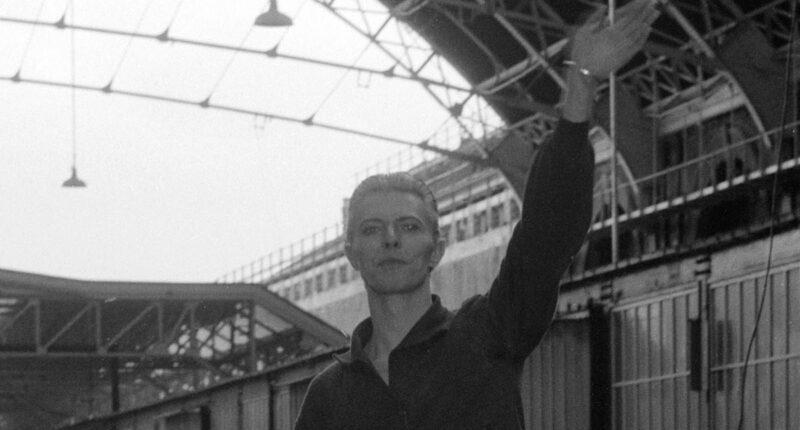Share this @internewscast.com
David Bowie said he would have been ‘a bloody good Hitler’ and claimed the Nazi leader was ‘one of the first rock stars’.
The British musician, often regarded as a major icon of the 20th century, revealed certain insights in a collection of magazine interviews during the mid-1970s.
In a 1977 discussion with Rolling Stone, as noted by the Times, the Under Pressure singer mentioned: ‘Everyone was convincing me that I was some kind of savior, particularly during my initial American tour back in 1972.’
‘I got hopelessly lost in the fantasy. I could have been Hitler in England. Wouldn’t have been hard.
‘The shows became so incredibly intense that even the media commented, “This isn’t just rock music; it’s dangerously reminiscent of Hitler! Action needs to be taken!”
‘And they were correct. It was indeed overwhelming. Frankly, I ponder now, perhaps I would have made a formidable Hitler. I’d have been quite a remarkable dictator. Very peculiar and undoubtedly insane.’
In an interview nearly two decades later, in 1993, the musician expressed regret, attributing any inappropriate remarks he made to the music outlet to his ‘exceptionally messed-up state at the time’.
But the entire affair has now resurfaced with the publication of a new book about rock and pop’s enduring problematic fascination with Nazism.

David Bowie (shown in an image upon his arrival at Victoria station in May 1976) claimed he could have been ‘an excellent Hitler’ and described the Nazi leader as ‘one of the original rock stars’.

The British musician (pictured onstage as his Thin White Duke persona in May 1976), widely considered one of the biggest stars of the 20th century, made the confessions in a series of magazine interviews in the mid-seventies
Music historian Daniel Rachel’s This Ain’t Rock ‘n’ Roll, which also explores other stars like the Sex Pistols’ Sid Vicious, is set for publication on November 6.
Bowie’s remarks to Rolling Stone were not his only interventions on the fascistic and barbarous political ideology of Nazism and its leader.
They came after Bowie had told lad mag Playboy in 1976: ‘Rock stars are fascists.
‘Adolf Hitler was one of the first rock stars. Look at some of his films and see how he moved.
‘I think he was quite as good as Jagger. It’s astounding. And boy, when he hit that stage, he worked an audience. Good God!’
The singer created and took on multiple personae in his career, including the Thin White Duke, most associated with his tenth album Station to Station (1976).
The well-groomed, blonde look, characterised by a white shirt with a black waistcoat and trousers, differed from previous flamboyant incarnations like Ziggy Stardust.
And it was a highly controversial reinvention, with Bowie describing the persona as ‘a very Aryan, fascist type’ in 1975.
The musician called at the same time for ‘an extreme right front [to] sweep everything off its feet and tidy everything up’.
He was also photographed a year later in London doing what looked like a Nazi salute standing in the back of an open-top car – though claimed he was just waving at fans.
His interest in the ideology appeared to begin in 1969, when he told Music Now! magazine: ‘This country is crying out for a leader.
‘God knows what it is looking for but if it’s not careful it’s going to end up with a Hitler.’
Bowie released several songs over the next few years exploring fascism, including The Supermen (1970), Oh! You Pretty Things (1971) and Quicksand (1971).
The Thin White Duke character emerged soon after and the artist’s brief to his set designer for his 1974 tour Diamond Dogs was: ‘Power, Nuremberg and Metropolis.’
It was only two years later, when the problematic photograph of the singer with his arm raised in the back of the car was taken, by a man named Chalkie Davies.
He said when he developed the image, it was blurred and Bowie’s arm was not pictured very clearly – and some retouching was done before its publication.

He was photographed in 1976 in London (pictured) doing what looked like a Nazi salute standing in the back of an open-top car – though claimed he was just waving at fans
Tubeway Army frontman Gary Numan, who happened to be in the crowd that day, has previously said he is adamant it was not a Nazi salute.
He said he did not hear any fellow fans there on the day say they thought it was.
Bowie told the Daily Express at the time: ‘I’m astounded anyone could believe it. I have to keep reading it to believe it myself.
‘I don’t stand up in cars waving to people because I think I’m Hitler. I stand up in cars waving to fans… It upsets me.
‘Strong I may be. Arrogant I may be. Sinister I’m not. What I am doing is theatre.’
But the Musicians’ Union (MU), a year later, called for Bowie’s expulsion, with member and British composer Cornelius Cardew saying: ‘This branch deplores the publicity recently given to the activities and Nazi style gimmickry of a certain artiste and his idea that this country needs a right-wing dictatorship.’
After a vote ended in a tie, Cardew weighed in again and the motion passed: ‘When a musician declares that he is “very interested in fascism” and that “Britain could benefit from a fascist leader” he or she is influencing public opinion through the massive audiences of young people that such pop stars have access to.’
Bowie responded: ‘What I said was Britain was ready for another Hitler, which is quite a different thing to saying it needs another Hitler.’
And his remorseful interview in 1993, with Arena magazine, addressed the entire ordeal: ‘It was this Arthurian need. This search for a mythological link with God.
‘But somewhere along the line, it was perverted by what I was reading and what I was drawn to. And it was nobody’s fault but my own.’
He also told music publication NME that year: ‘I wasn’t actually flirting with fascism per se.
‘I was up to the neck in magic which was a really horrendous period… The irony is that I really didn’t see any political implications in my interest in Nazis.
‘My interest in them was the fact that they supposedly came to England before the war to find the Holy Grail at Glastonbury and this whole Arthurian thought was running through my mind.
‘The idea that it was about putting Jews in concentration camps and the complete oppression of different races completely evaded my extraordinarily f***ed-up nature.’
And Bowie later also re-examined the issue as a concerned parent, before he moved out of Germany in 1979: ‘I didn’t feel the rise of the neo-Nazis until just before I moved out, and then it started to get quite nasty.
‘They were very vocal, very visible. They used to wear these long green coats, crew cuts and march along the streets in Dr Martens.

His Thin White Duke character (pictured, onstage in May 1976) was a highly controversial reinvention, with Bowie describing the persona as ‘a very Aryan, fascist type’ in 1975
‘You just crossed the street when you saw them coming. Just before I left, the coffee bar below my apartment was smashed up by Nazis…
‘I thought, “This is not a place for [my son] to be growing up. This could get worse”.’
Rachel’s book re-examines this legacy – just a month after Bowie’s archive opened to the public at the V&A East Storehouse in east London last month.
The author said of the singer’s remarks: ‘Bowie, Mick Jagger and Bryan Ferry [frontman of Roxy Music] have talked about the impact of Leni Riefenstahl’s film of the Nuremberg Rallies [Nazi propaganda events], and when you watch Triumph of the Will, it’s easy to see a parallel with Hitler doing a Sieg Heil before thousands of people and a rock star on the lip of a stadium stage, controlling an audience.
‘But in rock’n’roll there has been an attempt to divorce the spectacle [of Nazism] from the reality, which was an attempt to exterminate the Jewish people.
‘These musicians are divorcing theatre from mass murder.’
The reason for writing the work came from Rachel’s upbringing by a Jewish family in Birmingham in the eighties when, like many, he was a fan of the Sex Pistols.
The punk rock band’s 1979 song Belsen Was A Gas, suggesting the Bergen-Belsen Nazi concentration camp was a ‘gas’, slang for a fun time, was highly controversial.
And bassist Sid Vicious was often spotted wearing a swastika armband or T-shirt, to widespread outrage.
Rachel would at first happily sing along to that track or laugh at the pictures of Sid Vicious – before he began to understand, at home, what the Holocaust was.
He soon found himself profoundly affected and confused by the contrast of having seen images of Belsen – but still singing the Sex Pistols’ song.
Rachel visited sites of concentration camps in Poland in 2023, where he saw SS membership cards and swastika armbands in nearby antiques shops.
He himself was fascinated by the objects and even almost felt an instinct to buy them – so he understands music’s interest in the ideology to some extent.
But it could not shake his feeling it is just simply not right, recalling, for instance, when The Who’s Keith Moon and Bonzo Dog Doo-Dah’s Vivian Stanshall dressed as Nazis and paraded around the Jewish north London area of Golders Green in 1970, only 25 years after the Holocaust.
The writer dubbed the move stupid and provocative – somewhat the modus operandi of rock bands, which their teams must therefore try to rein in, he explained.
Rachel also wondered if music’s Nazi obsession is about a lack of Holocaust history, not compulsory in British schools until 1991 – and still yet to be in 23 US states.
A greater understanding of the genocide should now be embedded in the genre, he explained, even if it was not before.
When he approached musicians who had used Nazi imagery, many did not respond, perhaps understandably, he explained.
It meant the author mostly resorted to how stars explained it at the time – citing variously dysfunction, like Bowie, a kind of rebellion, or claims of ignorance.
And many musicians, he said, have managed to handle Nazism more thoughtfully and less tastelessly in their music.
French songwriter Serge Gainsbourg’s 1975 album Rock Around The Bunker, for instance, about Hitler’s last days, was written to ‘exorcise the period I lived in when I was a kid, when I was marked with a yellow star’.
Rachel said he did not wish to denigrate the musicians he wrote about – but simply to ask if art can be separated from the artist anymore.
This Ain’t Rock ‘N’ Roll: Pop Music, the Swastika and the Third Reich by Daniel Rachel is set for publication by White Rabbit on November 6.

















